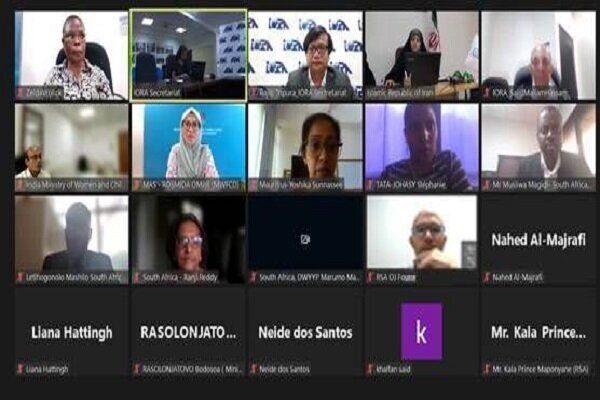TEHRAN –Iran plans to benefit from the potential of the Indian Ocean Rim Association (IORA) to implement projects for empowering women in the country.
The 9th meeting of the Working Group of the Women's Economic Empowerment (WGWEE) of the IORA was held virtually today under the chairmanship of Iran and the presence of representatives of the member states.
The WGWEE is the main body tasked with improving Women's Economic Empowerment in IORA and was established in August 2018.
IORA has 23 member states, and 21 representatives attended the meeting.
During the meeting, Khadijeh Karimi, director general for international affairs at the vice presidency for women and family affairs, while announcing Iran’s re-election as the chairman of the working group, emphasized the need for boosting cooperation among member states to be able to successfully implement the programs of the working group for the next two years, Mehr news agency reported.
“Currently, IORA’s working groups operate separately which has reduced the effectiveness of their actions. Therefore, the Islamic Republic of Iran aims to use the potential of other working groups to enhance women’s empowerment. Also, effective communication within the working group should be part of the agenda of other working groups,” Karimi said.
The meeting included a report of the work plan for the last two years, ongoing projects, and the proposals of the member countries were discussed and reviewed.
It was decided that the representatives of the member states submit their plans and proposals to our country through the secretariat after consulting with the relevant authorities for further consideration.
IORA work plan
The Indian Ocean Rim Association (IORA) has recognized the crucial role of Women's Economic Empowerment (WEE) in achieving sustainable development within the region.
Since 2013, IORA has actively pursued this goal, understanding that empowering women is not just a standalone priority, but intertwined with all other areas of regional cooperation.
This commitment is reflected in IORA's second action plan (2022-2027), which outlines the strategic objective:
"Promoting gender equality and the empowerment of women and girls, ensuring women's rights, access, and opportunities for participation and leadership in the economy, and eliminating violence and discrimination against women and girls in all its forms. Realizing the full prosperity of the region requires investing in the empowerment of women and girls."
To achieve this ambitious goal, IORA member states have collaboratively developed a work plan outlining specific activities and initiatives. This plan serves as a roadmap for advancing WEE across the Indian Ocean region, fostering economic opportunities for women, and ultimately, contributing to a more prosperous and equitable future for all.
Iranian women empowered after Islamic Revolution
The status of women in various fields was improved after the Islamic Revolution and women, as half of the country’s population, have been leading in many fields.
After the victory of the Islamic Revolution in February 1979 by toppling the Pahlavi regime [the last Iranian royal dynasty, ruling for almost 54 years between 1925 and 1979], women were given equal rights to shape their futures. The Islamic Revolution provided them a chance to build their distinct identity and they have been tremendously successful in doing that.
There were extensive changes in the fields of science, education, economy, employment, and presence in management positions for women. Now a large part of activists in various fields of academia, business, and management are made up of capable Iranian women.
Education as a social value for women is seen as real freedom for them. Illiteracy among women and girls has been nearly eradicated as the literacy rate reached 99.3 percent and the ratio of female to male students has increased by 28 percent.
According to the latest data, nearly 60 percent of all university students are females today. The percentage of women in higher education has increased nearly 21 times since the Revolution.
The notable presence of women in the education sector has had a remarkable impact on the job market of the country as well, with women taking more jobs in both the public and private sectors.
Leader of the Islamic Revolution Ayatollah Seyyed Ali Khamenei in one of his speeches said, “It is wrong to assume, we should prevent women from partaking in economic and social activities with reference to Islam. Islam has not prescribed such a thing. However, Islam has not recommended imposing hard work, tough businesses, or social and political tasks on women, either. Islam has adopted a moderate viewpoint; that is to say, if women have the opportunity and the time, and if it does not prevent them from bringing up their children, if they are enthusiastic and eager and have the physical strength and energy, and if they are willing to take part in social, political and economic activities, they should not be prevented. But if they are forced to take a job and work certain hours per day so that they can have a share in covering the household expenses, this is not what Islam has asked women. Islam considers this as a form of imposition on women.” (September 18, 1996)
TAGS


No comments:
Post a Comment